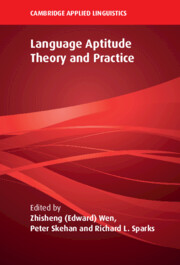Book contents
- Language Aptitude Theory and Practice
- The Cambridge Applied Linguistics Series
- Language Aptitude Theory and Practice
- Copyright page
- Contents
- Figures
- Tables
- Editors and Contributors
- Preface and Acknowledgments
- 1 Language Aptitude Research
- Part I Revisiting and Refining Aptitude Tests
- Part II Aptitude Testing of Diverse Groups
- Part III Innovative Perspectives and Paradigms
- 10 The Neurobiology of Language Aptitude, Musicality and Working Memory
- 11 The Linguistic Coding Differences Hypothesis (LCDH) and L2 Learning
- 12 Variability of Language Aptitude and Working Memory in EFL Learners’ Listening Development
- 13 An Aptitude Model for Translating and Interpreting
- Part IV Aptitude–Treatment Interaction (ATI)
- Part V Final Commentaries
- Index
- References
11 - The Linguistic Coding Differences Hypothesis (LCDH) and L2 Learning
A Thirty-Year Retrospective
from Part III - Innovative Perspectives and Paradigms
Published online by Cambridge University Press: 27 May 2023
- Language Aptitude Theory and Practice
- The Cambridge Applied Linguistics Series
- Language Aptitude Theory and Practice
- Copyright page
- Contents
- Figures
- Tables
- Editors and Contributors
- Preface and Acknowledgments
- 1 Language Aptitude Research
- Part I Revisiting and Refining Aptitude Tests
- Part II Aptitude Testing of Diverse Groups
- Part III Innovative Perspectives and Paradigms
- 10 The Neurobiology of Language Aptitude, Musicality and Working Memory
- 11 The Linguistic Coding Differences Hypothesis (LCDH) and L2 Learning
- 12 Variability of Language Aptitude and Working Memory in EFL Learners’ Listening Development
- 13 An Aptitude Model for Translating and Interpreting
- Part IV Aptitude–Treatment Interaction (ATI)
- Part V Final Commentaries
- Index
- References
Summary
L2 acquisition is frequently contrasted with L1 acquisition on the basis of the relative difficulty of the former and its variability across learners. The variability in L2 is attributed to some combination of contextual factors, for example, classroom vs. immersion learning, additive vs. subtractive evaluation of L2, the typological distance between L1 and L2, and/or L2 aptitude. Historically, individual differences (IDs) in L1 ability have seldom been considered an explanatory factor in L2 learning. Instead, there has been an assumption that most individuals achieve full linguistic competence in L1. However, this view of L1 development is incorrect. Individual differences in L1 skills have been found to be large and stable across development. Since 1991, the Linguistic Coding Differences Hypothesis (LCDH) has maintained that the primary causal factors in L2 achievement are linguistic and posited a connection between IDs in L1 skills and IDs in L2 aptitude and L2 achievement. Studies over 30 years with U.S. L2 learners have consistently revealed strong relationships between IDs in L1 ability and L2 achievement. Further, there are long-term relationships between L1 ability and L2 aptitude/L2 achievement many years later. In this chapter, the author reviews the extensive evidence showing that IDs in L2 are moderated by IDs in L1 and that L1 and L2 have a common underlying foundation.
Keywords
- Type
- Chapter
- Information
- Language Aptitude Theory and Practice , pp. 275 - 301Publisher: Cambridge University PressPrint publication year: 2023
References
- 1
- Cited by

